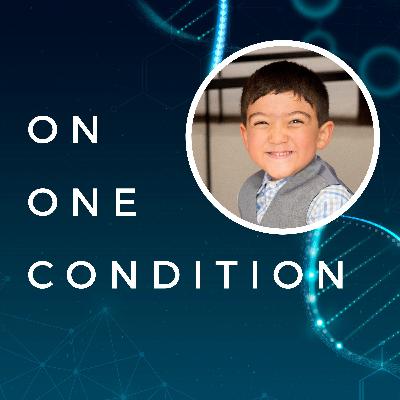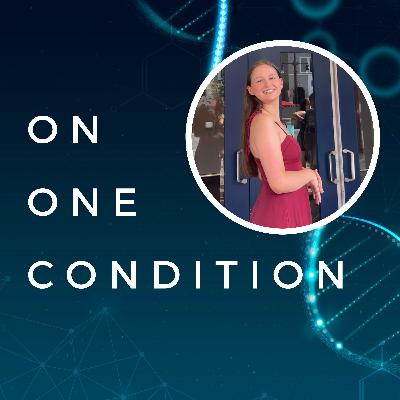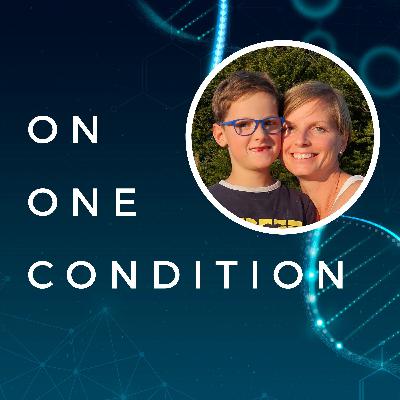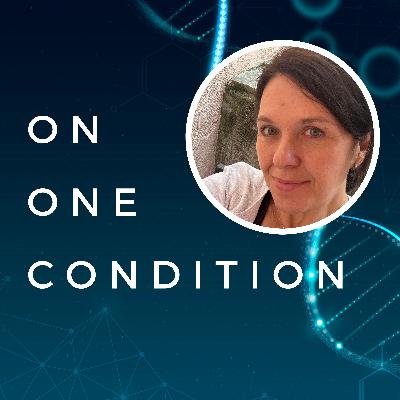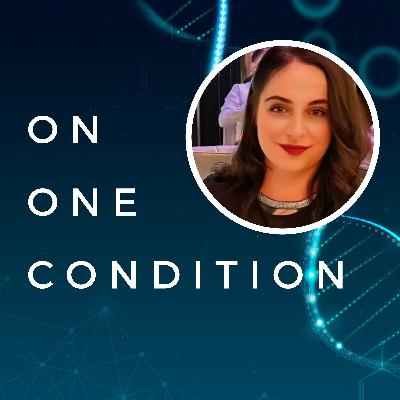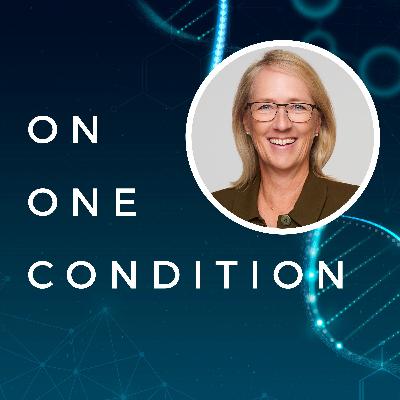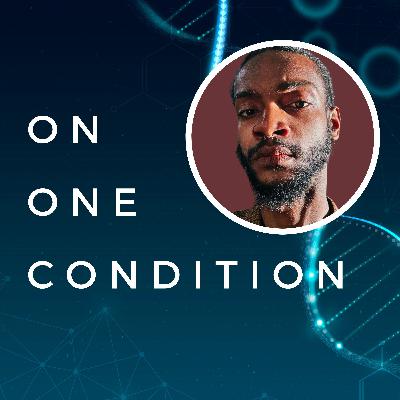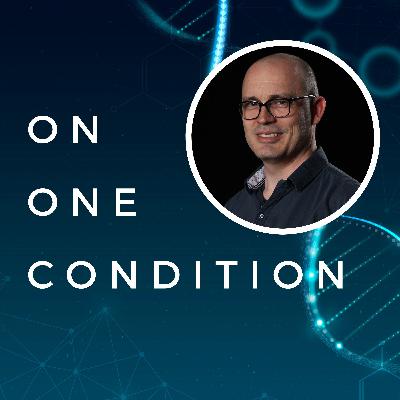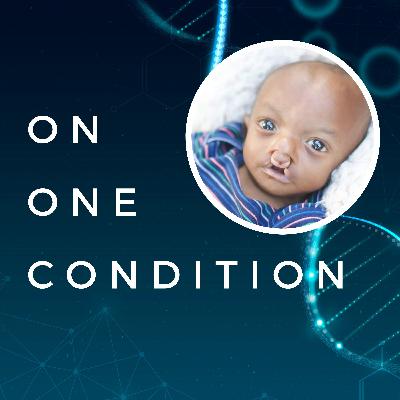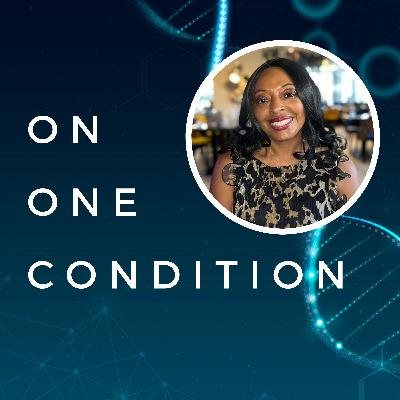Discover On One Condition
On One Condition

On One Condition
Author: Sylvain Berthelot
Subscribed: 1Played: 6Subscribe
Share
Description
On One Condition is a podcast for anyone who wants to learn about a specific health condition. Hear from people who live with a condition, how it affects them and how they manage it. Sylvain Berthelot has worked in the clinical trial industry for over a decade. He is naturally curious and passionate about how the body functions. Through his interviews, he aims to give fellow human beings a voice, spreading the word about the multitude of medical conditions that affect us.
80 Episodes
Reverse
Sylvain speaks with Roberta about living alongside Alagille syndrome through her daughter Chloe's journey. Roberta shares what it means to parent a child with a rare, multi-system condition, from the shock of an early diagnosis, to years dominated by relentless itching, sleep deprivation, and the emotional weight of watching her child suffer.
The conversation explores not only the medical realities of Alagille syndrome, but also the invisible burdens placed on caregivers, particularly when support systems fall short. Roberta reflects on the life-changing impact of clinical trials, the complexities of liver transplantation, and the long road toward independence for a young adult living with a chronic illness. Throughout, there is a quiet but powerful thread of hope, grounded in medical progress, community, and the small, human moments that sustain families through unimaginable challenges.
The song Roberta chose is Here Comes The Sun by the Beatles.
Brandon shares a deeply personal and grounded account of living with granulomatosis with polyangiitis (GPA), a rare and potentially life-threatening autoimmune vasculitis. Brandon walks us through his diagnosis as a young Division I athlete, the long road to remission, and the physical and emotional toll of repeated relapses, impacting his lungs, kidneys, and identity as a runner.
Beyond the medical realities, this conversation gently explores grief, mental health, and the quiet isolation that often accompanies rare disease, especially in a sport environment when there is a pressure – external or self-inflicted – to "push through". Brandon reflects on learning to listen to his body, manage stress, and redefine success away from constant striving.
The episode also highlights the power of community, advocacy, and shared stories through Brandon's work with the Vasculitis Foundation, a reminder that inspiration doesn't always come from extraordinary achievements; sometimes it comes from showing up, telling the truth, and helping others feel less alone.
The song that Brandon chose is Father's Son by Steven Wilson Jr.
Sylvain speaks with Gay Grossman about life with ADCY5, a rare genetic movement disorder, and the journey she and her daughter Lilly have travelled together. Gay shares the long and often lonely road to diagnosis, the physical realities of a condition that affects the body but not the mind, and the quiet resilience Lilly has shown since childhood. The conversation moves through years of misdiagnosis, advocacy in schools, sleepless nights, and relentless problem-solving, before arriving at a moment of transformation: a treatment discovered through community, research, and lived experience that has profoundly changed Lilly's quality of life. Above all, this episode is a story about perseverance, parental advocacy, and the belief that understanding the root cause can change everything, not just for one family, but for many.
The piece of music that Gay chose is Canon by Johann Pachelbel.
Marguerite shares the story of her son Louis and their life with Prader-Willi syndrome (PWS), a complex rare disease. Marguerite speaks with honesty, warmth and clarity about the medical, emotional and practical realities of raising a child with a rare genetic condition, from Louis's fragile start in neonatal intensive care to adulthood in a specialist supported living environment. She explores complex themes such as food security, anxiety, autism, and the invisible labour of caregiving, while challenging societal assumptions about success, independence and what a "good life" looks like. Marguerite is a strong advocate for the PWS community, and the importance of social care for children and families dealing with a rare condition. This episode is ultimately a powerful reminder that with understanding, routine, community and the right support, people with Prader-Willi syndrome can live happy, meaningful lives – and that listening to those with lived experience is essential.
The song that Louis chose is Say Something by Justin Timberlake featuring Chris Stapleton.
This is the story of Yiannis, nicknamed "Mr. Sunshine", told by his mother Angela. Yiannis is a 5-year-old boy who lives with the ultra-rare IRF2BPL-related disorder, which has affected his development in many ways. Angela describes the profound ways in which this condition has reshaped their lives, and how hope is their drive to make a difference for Yiannis and other children affected by IRF2BPL.
Angela's story is one of fierce advocacy and unconditional love. After Yiannis' diagnosis, she and her husband founded Yellow for Yiannis, a foundation devoted to advancing research into the condition and supporting other families facing similar diagnoses. Angela balances the day-to-day joy of raising her son, with her fight to be heard by the scientific community to find a suitable treatment for Yannis.
Music, especially "Here Comes the Sun" by The Beatles, plays a central role in their lives. Angela naturally selected this song for this episode.
Kayleigh opens up about living with Addison's disease, a rare condition where the adrenal glands fail to produce enough cortisol. Diagnosed at just 15, Kayleigh describes the medical journey that led to her diagnosis, the daily routines that keep her well, and the emotional resilience she's built along the way. Despite the challenges of balancing chronic illness with study and performance dreams in musical theatre, she radiates optimism and determination.
Kayleigh's story is one of strength, self-awareness, and adaptability – from planning university choices around nearby endocrinology hospitals to managing stress and illness triggers with remarkable maturity. Her openness about wanting more chronic illness representation in theatre is inspiring, as she reminds listeners of the importance of visibility and empathy.
The song that Kayleigh chose is The Chain by Fleetwood Mac.
Erika shares her family's seven-year journey to find a diagnosis for her son, Urban, who was eventually found to have SATB2-associated syndrome. With warmth and candour, Erika explains what it's like to live through years of uncertainty, to celebrate small milestones, and to help build a global community.
Erika reflects on motherhood, advocacy, and balance – from the early fears of losing her child to the hope and purpose she found through founding the SATB2 Europe Foundation. Her story is one of resilience, love, and an unshakable belief in community and connection.
The song that Erika chose is Ain't No Mountain High Enough by Marvin Gaye and Tammi Terrell.
Acromegaly is a rare condition caused by a pituitary tumour that leads to excess growth hormone. In this episode, Carolyn shares candidly how her symptoms, which developed slowly and over a long period of time, were mistaken for menopause or normal aging, until a series of unusual infections led to her diagnosis.
She reflects on the shock of being told she had a brain tumour, the challenges of undergoing major surgery, and the ongoing reality of living with residual tumour and long-term treatment. We also talk about the importance of listening to your body, and the progressive journey to recovery and feeling your own self again. Carolyn's story is one of resilience and hope: she has run marathons, completed triathlons, and learned to manage her energy carefully while still embracing life fully.
The song that Carolyn chose is Unwritten by Natasha Bedingfield.
Giselle shares her journey with Cushing syndrome, a rare and often misunderstood condition caused by an overproduction of cortisol. For years, Giselle's symptoms were dismissed by doctors as lifestyle-related issues, despite her insistence that something deeper was wrong. She describes the frustration of being unheard, the relief of finally receiving a diagnosis, and the resilience it took to advocate for herself. Giselle's story is not only about overcoming medical challenges but also about learning to trust her intuition, seek second opinions, and embrace recovery with hope and gratitude. Her message is one of strength, persistence, and encouragement for others who may be questioning their own health.
The song that Giselle chose is Rise Up by Andra Day.
Dariya's rare autoimmune kidney condition, HSP Nephritis, has shaped much of her childhood and continues to affect her life today. Diagnosed as a child after a long and difficult journey to recognition, Dariya opens up about the physical struggles, hospital experiences, and the lasting impact of her condition. She describes how it affected her mental well-being, leading to PTSD, OCD, and borderline personality disorder. Yet, Dariya speaks with honesty and resilience about how therapy, persistence, and the support of her loved ones have helped her find stability and strength. Today, she works in healthcare herself, bringing compassion and understanding to patients with complex needs.
The song that Dariya chose is Hold My Girl by George Ezra.
Kelly speaks with openness and wisdom about living with a condition that is not life-threatening, but deeply life-altering – wet age-related macular degeneration (Wet MD). From the shock of her first diagnosis to the reality of ongoing eye injections, she offers a candid look into the emotional, physical, and practical challenges of losing central vision. She shares a down-to-earth approach to adapting to her new condition, reflecting on the balance between what we can and cannot control, the importance of medical research, and the need for more compassionate health insurance systems. Her story is not just about vision loss – it is about perspective and finding peace in the journey.
The song that Kelly selected is Time by Lauren Daigle and Aodhan King.
Daniel lives with a rare genetic condition, Tuberous Sclerosis Complex (TSC), that results in non-cancerous tumors to grow in various organs, including the brain. From being diagnosed as a child through visible skin signs to managing the complexities of healthcare and advocacy as an adult, Daniel's journey is marked by courage and community. He opens up about the challenges of transitioning into adulthood, navigating a flawed healthcare system, and carrying the weight of an invisible condition. Daniel is passionate about ensuring adults with TSC are not forgotten and that healthcare becomes a human right, not a privilege.
He chose the song (Everything I do) I do it for you by Bryan Adams.
Nate shares his journey with HLH (hemophagocytic lymphohistiocytosis), a rare and life-threatening immune disorder. Misdiagnosed with Crohn's disease, he endured over 16 surgeries and a complete removal of his colon before receiving the right diagnosis, leading to a bone marrow transplant that saved his life. Nate reflects deeply on his path so far, marked by systemic healthcare issues, a search for his own identity, and a drive to advocate for himself and others. Nate also discusses how being a queer Black man with a rare condition has shaped his experience of the world and his passion for health equity, leading to a degree in Health Services Management. Nate's story is a powerful testament to resilience, authenticity, and the importance of being seen and heard as your true self.
The song Nate chose is Alien Superstar by Beyoncé.
Rob shares his personal journey growing up with severe haemophilia A, a rare bleeding disorder. Diagnosed as a baby due to family history, Rob and his brothers inherited the condition from their mother, who is a carrier of a mutated gene leading to haemophilia. His story spans from childhood limitations, frequent injections, and a sense of isolation, to the profound impact a life-changing treatment can have. Rob also reflects on what it means to work in clinical research while being directly impacted by its advances. This episode is a compelling testament to resilience, progress in medicine, and the hope that future generations may never experience what he and his brothers did.
The song that Rob chose is Iris by The Goo Goo Dolls.
Taylor shares her traumatic and transformative journey of being diagnosed with a rare condition – atypical hemolytic uremic syndrome (aHUS) – triggered during childbirth. Her story is one of medical chaos, survival against all odds, and learning to mother through unimaginable obstacles. With grace and humour, Taylor opens up about the physical devastation of her illness, the emotional toll of being separated from her newborn daughter, and the importance of timely diagnosis and innovative treatments. She also reflects on how becoming a patient changed her relationship with vulnerability, resilience, and advocacy.
The song Taylor chose is Be (For July) by Dustbowl Revival, written by her husband Zach Lupetin for their daughter.
Kevin opens up about living with PKU, a rare metabolic condition diagnosed at birth that requires lifelong dietary management. As a passionate advocate and storyteller, Kevin walks us through his journey, from early challenges of growing up with a restrictive diet to becoming a global voice for the PKU community. The conversation dives into mental health, feelings of isolation, access disparities in healthcare, and the healing power of music and connection. Kevin's vulnerability and perspective offer not just education, but comfort to others navigating rare diseases.
The song that Kevin chose is Shadow Days by John Mayer.
A first on the podcast, Sylvain welcomes two guests, Kristina Morgan and Sana Ansari, both living with Type 1 Diabetes. They each have a very different journey with the condition: Kristina was diagnosed at age 7, while Sana received her diagnosis at 38, during the peak of the COVID-19 pandemic.
Their conversation is both heart-opening and educational, shedding light on what it's truly like to live a "prescribed life" and how chronic illness reshapes relationships, routines, and self-perception.
The episode explores the emotional landscape of diabetes, from the guilt around food choices to the fear of unpredictable lows and highs, and the impact of the diagnosis on identity. Despite the challenges, Kristina and Sana share how their friendship and shared experiences have fostered mutual support and understanding in both their professional and personal lives.
In this moving episode, I speak with Sarita Edwards, a mother, advocate, and founder of the E.WE Foundation, about her family's journey after her son Elijah was diagnosed with Trisomy 18 (Edwards syndrome). Sarita shares the emotional rollercoaster of receiving Elijah's diagnosis at 22 weeks pregnant, the constant message of hopelessness delivered by healthcare professionals, and the overwhelming fear of loss that followed. Sarita explains how she fought this fear with hope and love, sharing a strong message of resilience.
Elijah, now eight years old, defies all medical expectations. Sarita's deep reflections explore how grief, uncertainty, and stigma transformed into purpose, acceptance, and connection. Through their journey, she and her family built a foundation to support other families navigating rare diagnoses, aiming to provide practical answers to questions that many face in times of uncertainty.
This episode is a powerful reminder of how lived experience changes lives, and how hardship can lead to a sense of purpose, and be turned into positive actions.
The song that Sarita chose is Even If by MercyMe.
Barbara shares her extraordinary journey through unimaginable challenges, from a discovery of multiple myeloma to a stem cell transplant, induced coma, severe sepsis, and ultimately the life-altering experience of a double amputation. Despite the harrowing experiences, Barbara's story radiates incredible resilience, hope, and positivity.
She speaks candidly about moments of darkness, vivid dreams during her coma, waking to devastating news, and rebuilding her life physically, emotionally, and spiritually. Her journey is an inspiring reminder that, even when life as you knew it changes forever, it's still possible to live fully and gratefully.
Barbara's strength and determination light up the conversation, making this an episode that stays with you long after you've listened.
The song that Barbara selected is Battle by Wookie.
MaryAnn opens up with honesty about her daily life with Complex Regional Pain Syndrome (CRPS) and Gastroparesis. She shares how a fall in the bathroom spiralled into a life-altering condition that left her unable to walk, in relentless pain, and dismissed by multiple healthcare professionals. Despite visible healing on scans, she was battling invisible agony.
We discuss the different ways MaryAnn manages her condition, with music therapy, strict routines, soft textures, and self-advocacy. We also talk about how she found a lifeline in ketamine therapy, a controversial yet transformative treatment that helped her regain mobility and her mental stability.
As a founder of several clinical research companies, MaryAnn also reflects on how living with a chronic illness has changed her perspective as a clinical professional, strengthening her belief in patient-centered care.
The song MaryAnn chose is I am woman by Emmy Meli.






